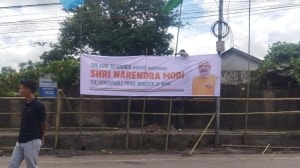Stay updated with the latest - Click here to follow us on Instagram
After 23 years: Two get 2-year jail term for cheating, forgery in trade deal with Bofors
According to the submission made by the CBI Anti-Corruption Bureau before the court, the case dates back to a trade contract in 1989 between India’s Ministry of Defence and Bofors for the supply of guns.
After being on trial for 23 years, two men were sentenced to two years’ imprisonment for cheating and forgery in a case related to a trade contract between India and Swedish arms manufacturer Bofors.The Additional Chief Metropolitan Magistrate of Mumbai last week convicted Abhay Udeshi (57) and Harish Pandya (61), observing that their actions were “an attack on the foreign trade policy of the Government of India”. The case against another accused, Vithaldas Udeshi, was abated after he passed away during the trial.
According to the submission made by the CBI Anti-Corruption Bureau before the court, the case dates back to a trade contract in 1989 between India’s Ministry of Defence and Bofors for the supply of guns.
One of the conditions of the contract was that for the purchase of guns by India, Bofors had to import commodities such as coffee and castor oil and its byproducts from India.
The Indian government nominated State Trading Corporation (STC) to monitor the export of commodities, while Bofors nominated Alexander Crichton Associates Limited in London, with its liaison office in Mumbai, under the counter trade obligation.
Jayant Oil Mills agreed to export castor oil and its byproducts through Alexander Crichton Associates under the monitoring of STC. Alexander Crichton Associates, Jayant Oil Mills and STC entered into a tri-party contract in 1989 for the export of 56 metric tonnes of Hydroxystearic Acid to Hamburg in Germany.
The CBI claimed that in 1989-90, the three accused entered into a criminal conspiracy to cheat STC. The CBI said that Pandya, then an employee of Jayant Oil Mills, prepared false export shipment documents without exporting the commodities to Germany.
The agency claimed that Pandya had acted on the instructions of the two other accused, who were also employees of Jayant Oil Mills.
The CBI said that without the actual export of goods, the forged documents were submitted to Alexander Crichton Associates. The documents were sent to the corporate office of STC in New Delhi, where officials noted discrepancies in the invoices submitted by Jayant Oil Mills and initiated an inquiry.
While the CBI registered a complaint against STC officials in 1992, the charges against them were later dropped and the three current accused were named.
The charges against them were framed in 2004. In total, nine prosecution witnesses were examined, including the STC officials first named in the FIR. The prosecution submitted evidence including documentary evidence, specimen signatures of Pandya and oral evidence.
The CBI said that according to the export shipment documents, 56 metric tonnes of commodity was shown to be exported in a single container when such a large quantity would have required four such containers.
The defence claimed that prosecuting the accused was illegal. It argued that the STC submitted the export documents directly to Alexander Crichton Associates. Udeshi also claimed that he was not a director of Jayant Oil Mills at the time of the offence and had no connection to the transaction.
The court ruled that it could not accept this defence by Udeshi at the stage of conviction when he did not submit it earlier in the trial.
“In my candid view, even though there is no loss of money to any person in the case, there was every likelihood of loss of reputation of the Government of India in the eyes of the International Trading Market, which cannot be calculated in terms of money. Even the act of the accused is an attack on the Foreign Trade Policy of the Government of India,” the court said.
Observing that the trial had dragged on for 23 years and the accused are at a senior age, the court sentenced them to two years’ imprisonment and fined them Rs 25,000 for each offence.
The two were convicted under sections pertaining to cheating and forgery, including sections 420, 467, 471 and Section 120 B (criminal conspiracy) of the Indian Penal Code.








